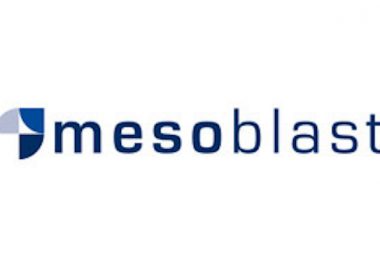NEW YORK, June 30, 2025 (GLOBE NEWSWIRE) — Mesoblast (Nasdaq:MESO; ASX:MSB), global leader in allogeneic cellular medicines for inflammatory diseases, today announced alignment with the United States Food and Drug Administration (FDA) on items required for filing a Biologics License Application (BLA) for Revascor® (rexlemestrocel-L) in the treatment of patients with ischemic heart failure with reduced ejection fraction (HFrEF) and inflammation.
Tag: Mesoblast
Mesoblast Files Request for Type B Meeting with FDA to Discuss Accelerated Approval Pathway for Revascor® in Ischemic Heart Failure
NEW YORK, April 02, 2025 (GLOBE NEWSWIRE) — Mesoblast (Nasdaq:MESO; ASX:MSB), global leader in allogeneic cellular medicines for inflammatory diseases, today provided an update on its plans to meet with the United States Food and Drug Administration (FDA) to discuss the accelerated approval pathway for Revascor® (rexlemestrocel-L) in the treatment of patients with ischemic chronic heart failure with reduced ejection fraction (HFrEF) and inflammation.
United States Food & Drug Administration (FDA) Supports Accelerated Approval Pathway for Rexlemestrocel-L in End-Stage Heart Failure Patients with a Left Ventricular Assist Device (LVAD)
NEW YORK, March 10, 2024 (GLOBE NEWSWIRE) — Mesoblast Limited (Nasdaq:MESO; ASX:MSB), global leader in allogeneic cellular medicines for inflammatory diseases, today announced that U.S. FDA supports an accelerated approval pathway for rexlemestrocel-L, Mesoblast’s allogeneic mesenchymal precursor cell (MPC) product, in patients with end-stage ischemic heart failure with reduced ejection […]
DREAM-HF Phase 3 Trial Results for Mesoblast Cell Therapy in Heart Failure Published in Journal of the American College of Cardiology (JACC)
Single Intra-Myocardial Intervention with Rexlemestrocel-L Reduced Cardiovascular Death, Myocardial Infarction or Stroke Over Mean Follow-Up of 30 Months in High-Risk Patients with Chronic Heart Failure NEW YORK, Feb. 27, 2023 (GLOBE NEWSWIRE) — Mesoblast Limited (Nasdaq:MESO; ASX:MSB), global leader in allogeneic cellular medicines for inflammatory diseases, today announced publication of the […]
Mesoblast Reports Operational and Financial Highlights for Quarter Ended December 31, 2022
NEW YORK, Feb. 27, 2023 (GLOBE NEWSWIRE) — Mesoblast Limited (Nasdaq:MESO; ASX:MSB), global leader in allogeneic cellular medicines for inflammatory diseases, today reported operational highlights and financial results for the period ended December 31, 2022. Dr. Silviu Itescu, Chief Executive of Mesoblast, commenting on the results said, “There is an […]
Appendix 4C Quarterly Activity Report
Mesoblast Operational and Financial Highlights for Quarter Ended December 31, 2022 NEW YORK, Jan. 31, 2023 (GLOBE NEWSWIRE) — Mesoblast Limited (Nasdaq:MESO; ASX:MSB), global leader in allogeneic cellular medicines for inflammatory diseases, today provided an activity report for the second quarter ended December 31, 2022. Financial Highlights Revenue from royalties […]
Mesoblast Reports Financial Results and Operational Highlights for Fiscal Year Ended June 30, 2022
At June 30, 2022, cash-on-hand was US$60.4 million with pro-forma US$105.5 million after raising gross proceeds of US$45 million via a private placement in August, 2022 Up to an additional US$40 million available from existing facilities subject to certain milestones Net operating spend of US$65.8 million for the 12 months […]
Rexlemestrocel-L to be Highlighted at Maxim’s Panel on Late-Stage Advancements in Heart Failure Therapeutics and Management
NEW YORK, July 11, 2022 (GLOBE NEWSWIRE) — Mesoblast Limited (Nasdaq:MESO; ASX:MSB), global leader in allogeneic cellular medicines for inflammatory diseases, today announced that rexlemestrocel-L, its allogeneic “off-the-shelf” product candidate for the treatment of chronic heart failure (CHF) with reduced ejection fraction (HFrEF), will be highlighted in a panel discussion […]
Appendix 4C Quarterly Activity Report
Mesoblast Operational and Financial Highlights for Quarter Ended March 31, 2022 NEW YORK, April 28, 2022 (GLOBE NEWSWIRE) — Mesoblast Limited (Nasdaq:MESO; ASX:MSB), global leader in allogeneic cellular medicines for inflammatory diseases, today provided an activity report for the third quarter ended March 31, 2022. Financial highlights Net cash usage […]
Mesoblast Appoints Dr. Eric Rose as Chief Medical Officer
NEW YORK, Feb. 01, 2022 (GLOBE NEWSWIRE) — Mesoblast Limited (Nasdaq:MESO ASX:MSB), global leader in allogeneic cellular medicines for inflammatory diseases, is pleased to announce the appointment of Dr. Eric Rose as the Company’s Chief Medical Officer (CMO). Dr. Rose has been a non-executive director of Mesoblast since 2013. In […]









